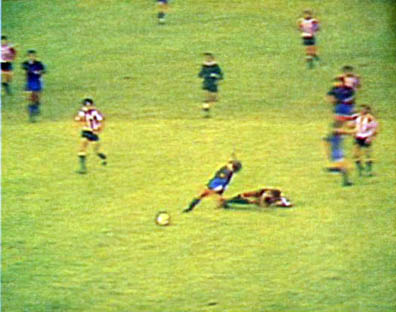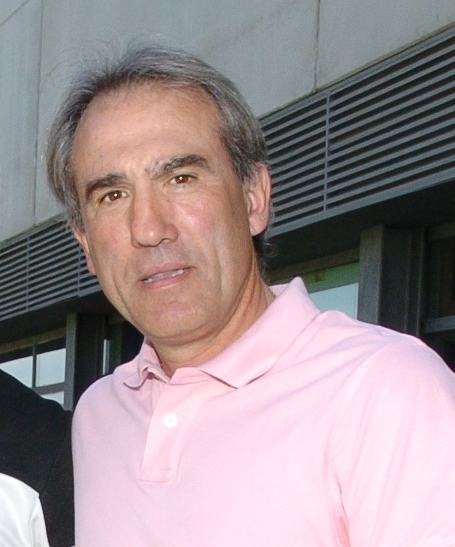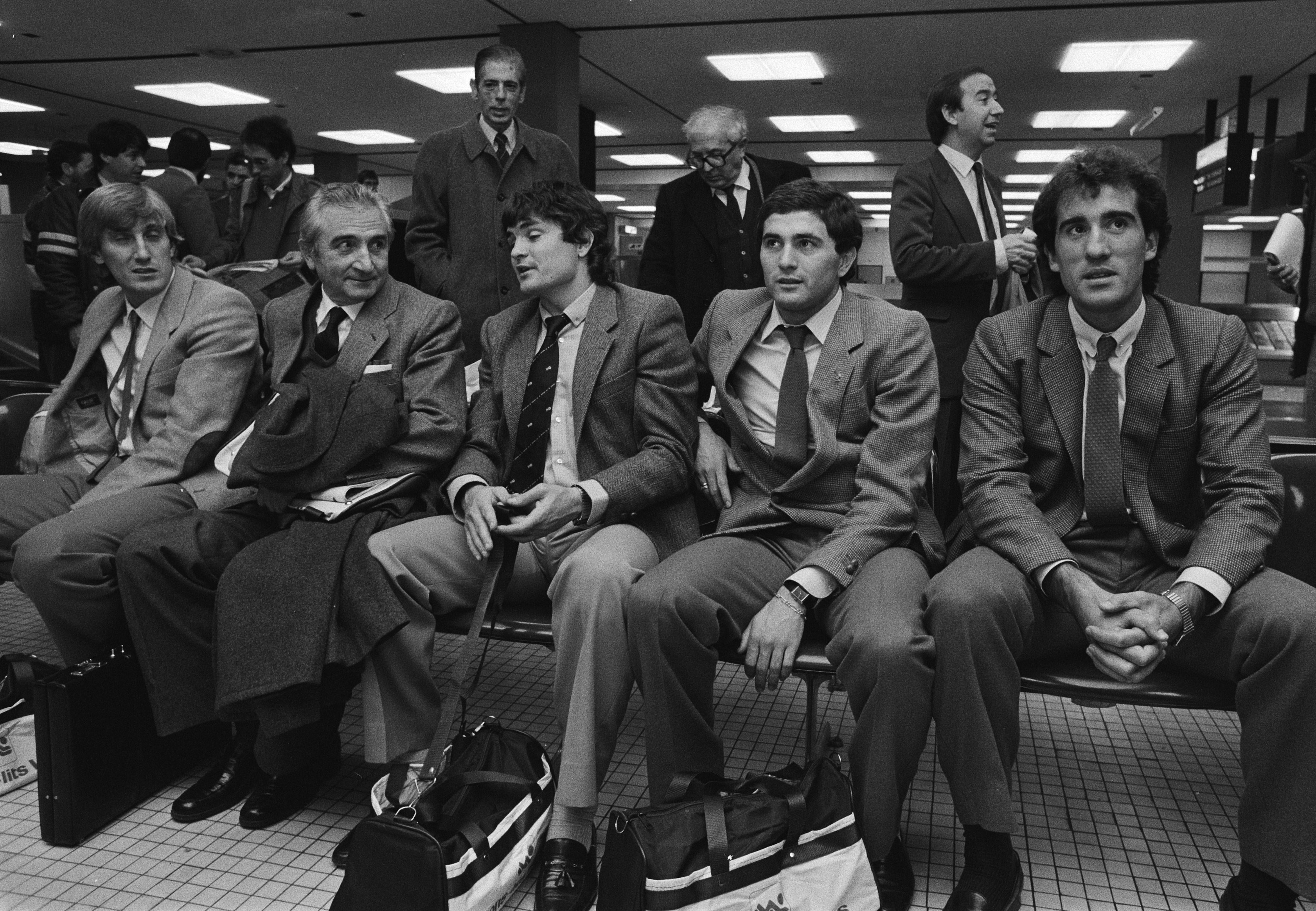1. Player Career
Andoni Goikoetxea's career as a player was marked by his fierce defensive prowess and a controversial reputation that defined his time in the spotlight.
1.1. Early Life and Athletic Bilbao Debut
Born in Alonsotegi, Biscay, Goikoetxea began his football journey with local club Arbuyo before joining the renowned Athletic Bilbao in 1973. After starting with the reserve side, Bilbao Athletic, he quickly established himself within the senior team squad. In his debut season with the first team, 1975-76, he scored four goals in 27 La Liga appearances. However, his role was somewhat limited in the subsequent three seasons, during which he made a total of only 24 appearances.
1.2. Athletic Bilbao's Golden Era
The 1980s marked a golden era for Athletic Bilbao, with Goikoetxea as a prominent and integral member of the team. Under the guidance of coach Javier Clemente, Goikoetxea, alongside key players such as Dani, José Ramón Gallego, José Núñez, Manuel Sarabia, and Andoni Zubizarreta, formed a formidable squad. This period saw the Basque club achieve significant success, including renewing their league title in the 1983-84 season. That same year, Athletic Bilbao famously secured "the double," winning both the league championship and the Copa del Rey. Additionally, the club claimed the Supercopa de España in 1984, completing a remarkable triple crown of domestic titles.
1.3. Controversies: Maradona and Schuster Fouls
Goikoetxea's career is indelibly linked to two high-profile, brutal fouls that earned him the moniker "Butcher of Bilbao" and raised significant questions about sportsmanship and player safety.

On September 24, 1983, Goikoetxea gained international notoriety for a tackle on Diego Maradona, then playing for FC Barcelona. This incident, occurring during a league match at the Camp Nou, was widely described as "one of the most brutal fouls ever delivered in the history of Spanish football." Goikoetxea tackled the Argentine superstar from behind, resulting in a fractured ankle for Maradona, who later likened the sound of his ankle breaking to that of wood. Prior to the incident, Goikoetxea was reported to have declared, "If necessary, I'll break Maradona's leg to stop him," a statement that highlighted his aggressive approach and seemed to foreshadow the incident.
The severity of the foul led English journalist Edward Owen to coin the phrase "Butcher of Bilbao," a nickname that would follow Goikoetxea throughout his career. FC Barcelona's coach at the time, César Luis Menotti, publicly condemned Goikoetxea, accusing him of "belonging to a 'race of anti-footballers'" and advocating for a lifelong ban from the sport. In response, the Royal Spanish Football Federation imposed a ten-match ban on Goikoetxea. Adding to the controversy, it was later reported that Goikoetxea kept the football boot he used to injure Maradona's ankle ligaments in a glass case at his home, a gesture perceived by many as a lack of remorse or a provocative display.
Two seasons prior to the Maradona incident, Goikoetxea had also severely injured another Barcelona midfielder, Bernd Schuster, with a tackle that left the German with a serious right knee injury from which he reportedly never fully recovered. This earlier incident further established Goikoetxea's reputation for dangerous play.
The intense rivalry between Athletic Bilbao and FC Barcelona, particularly fueled by these incidents, escalated to a dramatic climax during the 1984 Copa del Rey final in May. After Athletic secured a 1-0 victory, a mass brawl erupted on the pitch involving players from both teams. During the melee, Goikoetxea was seen kicking Maradona in the chest. For his actions in this brawl, Goikoetxea was initially handed an 18-game ban, though the suspension was later reduced to seven matches. These incidents significantly impacted perceptions of Goikoetxea, highlighting the dark side of his aggressive style and raising concerns about sportsmanship and player safety in football.
1.4. Later Club Career and Retirement
Following his successful but controversial tenure at Athletic Bilbao, Goikoetxea transferred to Atlético Madrid in 1987. He spent three years with the Madrid-based club, though his appearances were more limited compared to his time in Bilbao. He retired from professional football in 1990 at the age of 33. Over his career, Goikoetxea played a total of 369 competitive matches for Athletic Bilbao, scoring 44 goals.
2. International Career
Andoni Goikoetxea was a significant figure in the Spain national football team during the 1980s, earning 39 caps (international appearances) for his country. He made his senior international debut on February 16, 1983, in a match against the Netherlands.
He represented Spain in two major international tournaments: the UEFA Euro 1984 and the 1986 FIFA World Cup. At the 1986 World Cup in Mexico, Goikoetxea scored one of his four international goals from a penalty in a dominant 5-1 victory over Denmark in the round of 16, a match where Emilio Butragueño notably scored the remaining four goals. He scored his other international goals in friendly matches and World Cup qualifiers.
Beyond his appearances for the Spanish national team, Goikoetxea also played for the Basque national team, making four appearances between 1978 and 1990. In his earlier career, he represented Spain at youth levels, including one appearance for the Spain U-18 team in 1975 and three appearances for the Spain U-21 team in 1977.
3. Playing Style
Andoni Goikoetxea was renowned, and often criticized, for his exceptionally aggressive and physical playing style as a defender. His uncompromising approach on the field earned him widespread notoriety and several distinct nicknames. The most famous of these, "The Butcher of Bilbao," stemmed directly from his infamous tackles on Diego Maradona and Bernd Schuster, which left both players with severe injuries.
His rough style of play was so pronounced that in 2007, the English newspaper The Times named him the "hardest defender of all time." Another publication, The Sun, ranked him as the "second hardest footballer in history." Despite, or perhaps because of, this reputation, he was also known among Athletic Bilbao fans as El Gigante de AlonsoteguiThe Giant of AlonsoteguiSpanish, a testament to his imposing presence and importance to the club's defense. His playing style was a defining characteristic of his career, contributing both to his team's success and to a lasting, often controversial, legacy.
4. Coaching Career
Two years after retiring as a player, Goikoetxea embarked on a coaching career, beginning at the club level in 1996. His managerial journey saw him take charge of several Spanish clubs, often experiencing mixed fortunes.
He had two spells as manager of UD Salamanca, first from 1996 to 1998, during which he successfully guided the team to promotion from the Segunda División in the 1996-97 season, finishing second. His second tenure with Salamanca was in 2004-2005. He also managed SD Compostela (1998-1999) and had two periods at CD Numancia (1999-2000 and 2005-2007). Other clubs he managed included Racing de Santander (2000-2001) and Rayo Vallecano (2001).
Beyond club management, Goikoetxea also held national team coaching positions. He served as an assistant coach for the Spain national team under his former manager, Javier Clemente, during the 1994 FIFA World Cup held in the United States. He also managed the Spain U-21 team from 1992 to 1996, achieving a third-place finish in the 1994 UEFA European Under-21 Championship and a runner-up position in the 1996 UEFA European Under-21 Championship. He briefly managed the Spain U-20 team in 1995.
In June 2007, Goikoetxea joined Hércules CF, a second-tier club based in Alicante. However, his time there was cut short when he was suspended by the club and subsequently released at the end of the 2007-08 campaign after publicly stating that the club's internal structures "stank." His career also included a spell managing AD Ceuta from 2010 to 2011.
In late February 2013, Goikoetxea was appointed as the head coach of the Equatorial Guinea national team. However, his tenure was brief, as he was dismissed in January 2015, just three weeks before the start of the 2015 Africa Cup of Nations. The reason for his dismissal was attributed to poor performance in friendly matches, which included a loss to a lower-league side in Portugal.
5. Honours
Andoni Goikoetxea achieved several significant titles and awards throughout his playing and managerial careers.
5.1. As a Player
- Athletic Bilbao
- La Liga: 1982-83, 1983-84
- Copa del Rey: 1983-84
- Supercopa de España: 1984
- Spain
- UEFA European Championship runner-up: 1984
5.2. As a Manager
- Spain U21
- UEFA European Under-21 Championship runner-up: 1996; third place: 1994
6. Career Statistics
6.1. Club Statistics
| Club | Season | League | Copa del Rey | Europe | Copa de la Liga | Total | ||||||
|---|---|---|---|---|---|---|---|---|---|---|---|---|
| Division | Apps | Goals | Apps | Goals | Apps | Goals | Apps | Goals | Apps | Goals | ||
| Bilbao Athletic | 1973-74 | Tercera División | 4 | 0 | 0 | 0 | - | - | 4 | 0 | ||
| 1974-75 | 21 | 8 | 0 | 0 | - | - | 21 | 8 | ||||
| Total | 25 | 8 | 0 | 0 | 0 | 0 | 0 | 0 | 25 | 8 | ||
| Athletic Bilbao | 1974-75 | La Liga | 0 | 0 | 2 | 0 | - | - | 2 | 0 | ||
| 1975-76 | 27 | 4 | 1 | 0 | - | - | 28 | 4 | ||||
| 1976-77 | 10 | 0 | 2 | 0 | 4 | 0 | - | 16 | 0 | |||
| 1977-78 | 4 | 1 | 0 | 0 | 3 | 0 | - | 7 | 1 | |||
| 1978-79 | 10 | 1 | 3 | 0 | 0 | 0 | - | 13 | 1 | |||
| 1979-80 | 30 | 3 | 12 | 4 | - | - | 42 | 7 | ||||
| 1980-81 | 27 | 4 | 9 | 1 | - | - | 36 | 5 | ||||
| 1981-82 | 31 | 6 | 7 | 0 | - | 0 | 0 | 38 | 6 | |||
| 1982-83 | 24 | 4 | 5 | 0 | 1 | 0 | 2 | 0 | 32 | 4 | ||
| 1983-84 | 28 | 2 | 7 | 0 | 4 | 1 | 0 | 0 | 39 | 3 | ||
| 1984-85 | 31 | 3 | 6 | 2 | 2 | 0 | 2 | 0 | 41 | 5 | ||
| 1985-86 | 31 | 5 | 6 | 1 | 6 | 0 | - | 43 | 6 | |||
| 1986-87 | 24 | 2 | 5 | 0 | 3 | 0 | - | 32 | 2 | |||
| Total | 277 | 35 | 65 | 8 | 23 | 1 | 4 | 0 | 369 | 44 | ||
| Atlético Madrid | 1987-88 | La Liga | 13 | 0 | 4 | 0 | - | - | 17 | 0 | ||
| 1988-89 | 14 | 0 | 8 | 0 | 0 | 0 | - | 22 | 0 | |||
| 1989-90 | 8 | 0 | 0 | 0 | 2 | 0 | - | 10 | 0 | |||
| Total | 35 | 0 | 12 | 0 | 2 | 0 | 0 | 0 | 49 | 0 | ||
| Career total | 337 | 43 | 77 | 8 | 25 | 1 | 4 | 0 | 443 | 52 | ||
6.2. International Goals
Scores and results list Spain's goal tally first, score column indicates score after each Goikoetxea goal.
| No. | Date | Venue | Opponent | Score | Result | Competition |
|---|---|---|---|---|---|---|
| 1 | May 26, 1984 | Charmilles, Geneva, Switzerland | Switzerland | 4-0 | 4-0 | Friendly |
| 2 | November 14, 1984 | Hampden Park, Glasgow, Scotland | Scotland | 1-2 | 1-3 | 1986 World Cup qualification |
| 3 | June 18, 1986 | La Corregidora, Querétaro, Mexico | Denmark | 3-1 | 5-1 | 1986 FIFA World Cup |
| 4 | October 15, 1986 | Niedersachsenstadion, Hanover, Germany | West Germany | 2-2 | 2-2 | Friendly |
7. Assessment and Legacy
Andoni Goikoetxea's career leaves a complex and often contradictory legacy in the history of football. As a player, he was undeniably talented and a key force in Athletic Bilbao's most successful period, contributing significantly to their multiple titles in the 1980s. His physical dominance and defensive capabilities were crucial to his teams' achievements.
However, Goikoetxea's impact on football is more frequently assessed through the lens of his aggressive playing style and the controversial incidents that marked his career. The notorious fouls on Diego Maradona and Bernd Schuster not only defined his public image as "The Butcher of Bilbao" but also sparked broader discussions about player safety, ethical conduct, and the limits of physicality in the sport. The long-term injury suffered by Schuster, from which he reportedly never fully recovered, and the deliberate nature of the Maradona tackle, including Goikoetxea's alleged prior declaration of intent and his later retention of the boot, highlight a disregard for the well-being of his opponents. This uncompromising approach, while perhaps valued by some for its perceived toughness, contributed to a negative perception of sportsmanship and fair play.


His coaching career, though extensive, did not reach the same heights as his playing career, marked by several dismissals and a notable incident at Hércules CF where his outspoken criticism led to his departure.
Ultimately, Goikoetxea's legacy is one of a highly effective defender whose on-field success was often overshadowed by a reputation for brutality. While his contributions to Athletic Bilbao's "golden era" are undeniable, his methods and the impact of his actions on other players remain a significant and controversial part of his story, raising important questions about the boundaries of competitive aggression in professional sport.